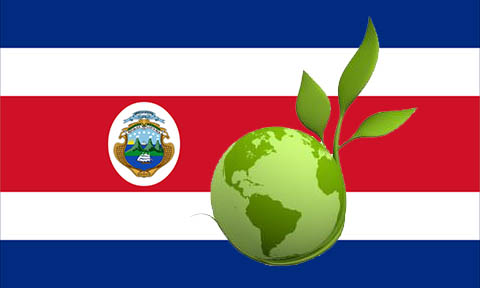 Costa Rica is on the forefront of working to create a cleaner and greener world. The government aims to be fully carbon neutral by 2021 and is working along with most of these organizations to make it happen! Costa Rica already owes 94% of it’s energy to alternative energy sources (hydroelectric, wind & geothermal), and a 3.5% tax on gasoline is used to compensate landowners for growing trees and protecting forests. Listed below are some of the main organizations fighting to keep Costa Rica green
Costa Rica is on the forefront of working to create a cleaner and greener world. The government aims to be fully carbon neutral by 2021 and is working along with most of these organizations to make it happen! Costa Rica already owes 94% of it’s energy to alternative energy sources (hydroelectric, wind & geothermal), and a 3.5% tax on gasoline is used to compensate landowners for growing trees and protecting forests. Listed below are some of the main organizations fighting to keep Costa Rica green
CST (Certification for Sustainable Tourism)
“The Certification for Sustainable Tourism Program – CST – is a product of the Costa Rican Tourism Board (ICT). The CST was designed to differentiate businesses of the tourism sector, based on the degree to which they comply with a sustainable model of natural, cultural and social resource management.”
CST is regulated by the Costa Rican National Accreditation Commission and consists of a scale of 5 “levels” of sustainable tourism achievement. Level 1 indicates that a company is taking it’s first steps in the process of sustainability,while 5 indicates a superior or outstanding achievement in sustainability. CST was designed to include direct incentives to companies making steps towards sustainability.These incentives grow proportionally with the levels achieved.
CST evaluates and judges these levels based on 5 criteria:
Physical-biological parameters (interactions between the company and the surrounding habit) Infrastructure and services (Energy saving, waste handling, water pollution)
Service management (Exclusive to to tour operator agencies and where they choose to operate)
External Client (how much the business allows and invites client to be active contributor to sustainability efforts)
Socio-Economic Environment (interaction of the establishment with the adjacent communities)
“The Blue Flag Ecological Program was created in response to the imminent dangers of beach pollution, its repercussions on public health and the tourism industry. It has reached its twelfth year of operations, with a marked increase that began in 2002.”
Blue Flag is also a product of the Costa Rican Tourism Board (ICT). Their main objective is to keep coastal communities pollution free. It recognizes and awards coastal communities with a blue flag based on 5 main categories. Communities must achieve 90% in order to be awarded the blue flag. Once the blue flag has been awarded, a community can receive between 1 and 4 stars based on additional criteria.
CNE (National Emergency Commission)
The CNE works as the lead agency in dealing with emergencies and natural disasters and works at integrating different levels of first responders. CNE maintains constant communication with scientific bodies like the National Meteorological Institute, Universities & different Technical Advisory Committees. It works to detect early warnings of natural disasters and to mitigate the impact of those disasters.
Once a disaster occurs, the CNE provides all the technical and financial support of the community affected. If warranted, they are also obliged to use Emergency Funds to support emergency care and also work to restore and rehabilitate those areas affected by the disaster.
MINAE (The Ministry of Environment and Energy)
Since the Costa Rican Government announced it’s carbon-neutrality plans, the Ministry, which was once a marginal sector, has become much more relevant to the country’s development plan. Thanks to the work done by the MINAE , Costa Rica is now among the top of the World Environmental Performance Index and is recognized worldwide for its efforts in the conservation and sustainable development. The Ministry works to improve the environment with four main Agendas:
-
– The Green Agenda (Conservation and sustainable use of earth’s biodiversity)
– The Blue Agenda (Oceans and Marine Life)
– The Energy Agenda (National Energy Plan)
– The Coffee Agenda (Regulations and Policies)
ICT (Costa Rican Tourism board)
Mission: “To promote a wholesome tourism development, with the purpose of improving Costa Ricans’ quality of life, by maintaining a balance between the economic and social boundaries, environmental protection, culture, and facilities.”
The Costa Rican Tourism Board is the government agency responsible for promoting tourism and specifically, sustainable tourism, in Costa Rica.
In 1997, the agency introduced a voluntary program (CST) in order to give incentives and recognize those agencies that were taking steps to becoming more sustainable. It’s aim was to “improve the way in which the natural and social resources are utilized, to motivate the active participation of the local communities, and to support the competitiveness of the business sector.”
They are also the instigators of Costa Rica’s “Blue Flag” program which promotes the care and conservation of Costa Rica’s beaches and coastal communities.
INBio (National Biodiversity Institute)
Mission: “To promote a greater awareness of the value of biodiversity as a means to ensure its conservation and improve the quality of life of human beings.”
InBio is a private research and diversity management centre that supports all efforts made to gather knowledge on Costa Rica’s biodiversity and promote sustainability. They are non-governmental & non-profit and they focus on inventory and monitoring of the country’s ecosystem, conservation efforts, communication and education, bio-prospecting & informatics.
CES (Certificate for Environmental Services)
CES is an organization that raises funds for the private sector by selling certificates that offset pollution. Its main objective is to conserve the forests by funding those individuals and businesses that can protect it. Purchasers can choose to help safeguard water (Recovery and Protection of CR’s watersheds), Conserve the living Forest ( Recovery and Protection of CR’s Forests) OR they can choose a Clean Travel certificate that offsets the carbon footprint left by their journey.
CANATUR (National Chamber of Tourism)
The National Chamber of Tourism is a private tourism organization that represents the interests of its members , offers benefits , provides services and supports the union of public and private efforts to enhance sustainable development of the sector. It works to promote Responsibility & Sustainability, Ethics & Integrity, Solidarity & Unity, Leadership & Proactivity, Excellence & Innovation.

